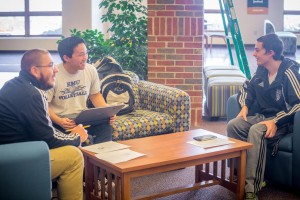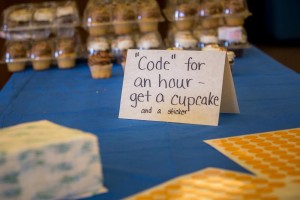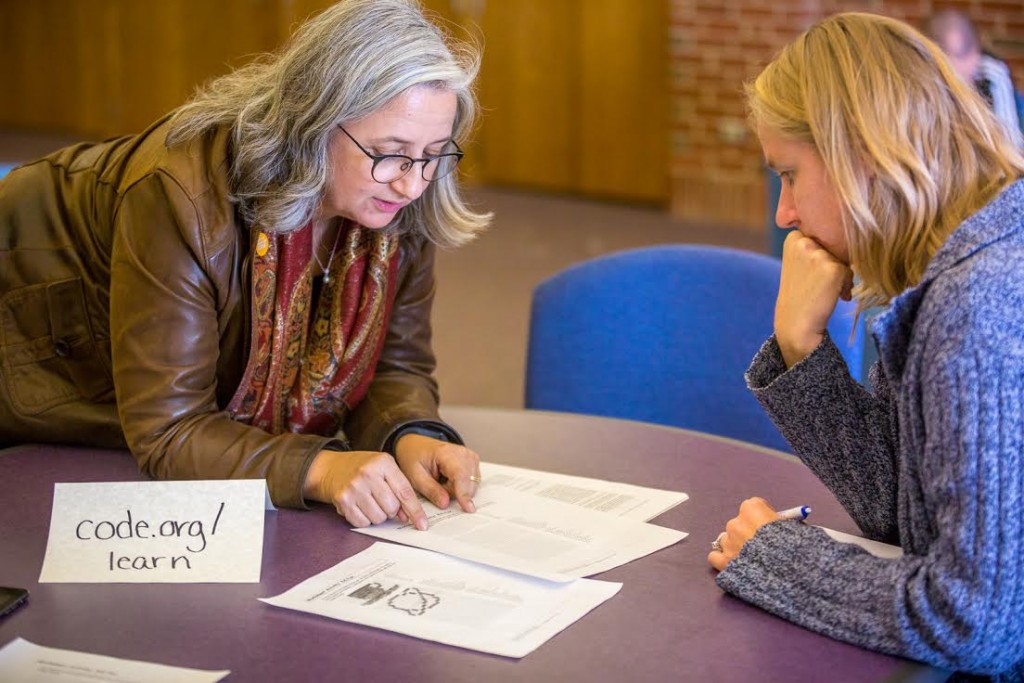For one day each year, during the One Hour of Code worldwide celebration of computer science, Eastern Mennonite University professor Dee Weikle spends not just One Hour, but several in the campus center. Her goal is to introduce students to code – not necessarily to teach coding itself (though she does that with simple pencil-and-paper worksheets) – but to raise awareness about technology and its possibilities.
Each year, the event grows a little bigger beyond a little gold sticker – and cupcakes to celebrate the birthday of famous female computer scientist, mathematician and military leader Grace Hopper. This year, Weikle invited education students to learn more about computational thinking, a kind of analytical thinking that works across disciplines.
“The goal with One Hour of Code is get more people thinking about and interested in programming,” Weikle said. “We need not only more programmers, but more programmers from a wide variety of disciplines and more programmers who are representative of our diverse world.”
More female programmers, more programmers of color, more programmers from all disciplines—she says – will give more and different insight into technological solutions to problems. Weikle doesn’t just support this agenda one day a year: she is constantly encouraging underrepresented students in the computer sciences to take classes, do well in those classes and network at conferences with others in the field.
From penciled squares to Java instructions

The Dec. 11 event drew staff, faculty and administrators in for exploration. Provost Fred Kniss and Vice President for Finance Daryl Bert had just spent a half hour playing around with a program in “R” to comprehensively analyze expenses. Bible and religion professor Peter Dula dutifully practiced simple coding with a worksheet, marking in squares to create a happy face, “just like a fax machine works,” Weikle explained, before he grabbed a cupcake and headed back to his office. Admissions counselor David Loughran pointed proudly to his gold sticker as he cruised through on his way to lunch.
Three computer science students – seniors Alvin Michael and Isaac Mast and junior Jacob Hertzler – shared their early experiences with coding. Hertzler says he enjoys “the power you have to solve problems.”
Computer Science 120 is the introductory programming class, in which students are introduced to Python and program their own project. “By the end of my first class, I could write the code to create the teacup easily,” Hertzler said, pointing to his worksheet. “And by the end of my advanced programming class, I could do this.”
“This” was a series of commands he’d hand-written in the programming language Java.
“I do that with just about everything now,” Hertzler said. “I sit there and look at it and think about whether I can write a program to do the work for me … A fun saying in the computer world is ‘a good programmer is a lazy programmer.’”
Hooked by gaming

Alvin Michael joins the discussion to somewhat reluctantly admit that back in middle school, he was addicted to the fantasy role-playing game Runescape—so addicted, in fact, that he logged 180 days (that’s six months, to spare you the math) of his life “in” the game.
“I lived five miles from anyone else and we had dial-up internet,” he says in defense.
But that game was his entry point into the analytics – and the fun – of writing code. Michael wrote one “specifically for woodcutting, an automated script that would find a tree, click on the tree until it filled the inventory, navigate to the nearest place, dump it and go back for more. The script would run all night and I would wake up and have thousands of logs.”
Best of all was that he beat the game at its own game: “If you got caught, you’d get banned, so you had to make it look as human as possible. I never got banned.”
Now Michael is interning at Blue Ridge Mac and looking forward to a career in computers. And he doesn’t play Runescape anymore.
Senior Isaac Mast interned last semester at VistaShare, a computer software company in Harrisonburg owned by EMU alumnus Daryl Myers and Goshen graduate Dave Smucker. VistaShare’s main product is Outcome Tracker, a software package that helps over 500 non-profit organizations keep track of their clients and outcomes. The organizations they serve fall into three categories − community and economic development agencies, social-service agencies, and asset-building programs.
Mast says the best part of that internship was working on “programs that helped people.” He hopes to use his degree – and his coding skills – in that way in the future.
“Programming can make our lives better, and make technology more accessible,” Weikle said, “but to do it, we need everyone to contribute.”
